Röt Formation
The Röt Formation or Rötton Formation (German for Röt Shale) is a geologic formation of the Buntsandstein in Germany. It preserves fossils dating back to the Middle Triassic period (Anisian or Aegean or Bithynian in the regional stratigraphy).[1] The formation overlies the Plattenstein and Solling Formations and is overlain by the Jena Formation.[2][3]
| Röt Formation Stratigraphic range: Anisian (Aegean or Bithynian) ~247–242 Ma | |
|---|---|
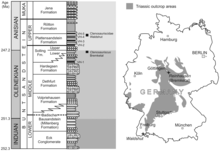 Stratigraphy and extent of the Triassic in Germany | |
| Type | Formation |
| Unit of | Buntsandstein |
| Sub-units | Violet Horizon 5 Member |
| Underlies | Jena Formation |
| Overlies | Plattenstein & Solling Formations |
| Lithology | |
| Primary | Limestone, mudstone, shale |
| Other | Sandstone |
| Location | |
| Coordinates | 51.5°N 11.9°E |
| Approximate paleocoordinates | 17.5°N 19.7°E |
| Region | Sachsen-Anhalt, Baden-Württemberg, Bavaria, Hessen |
| Country | |
| Extent | Central Germany |
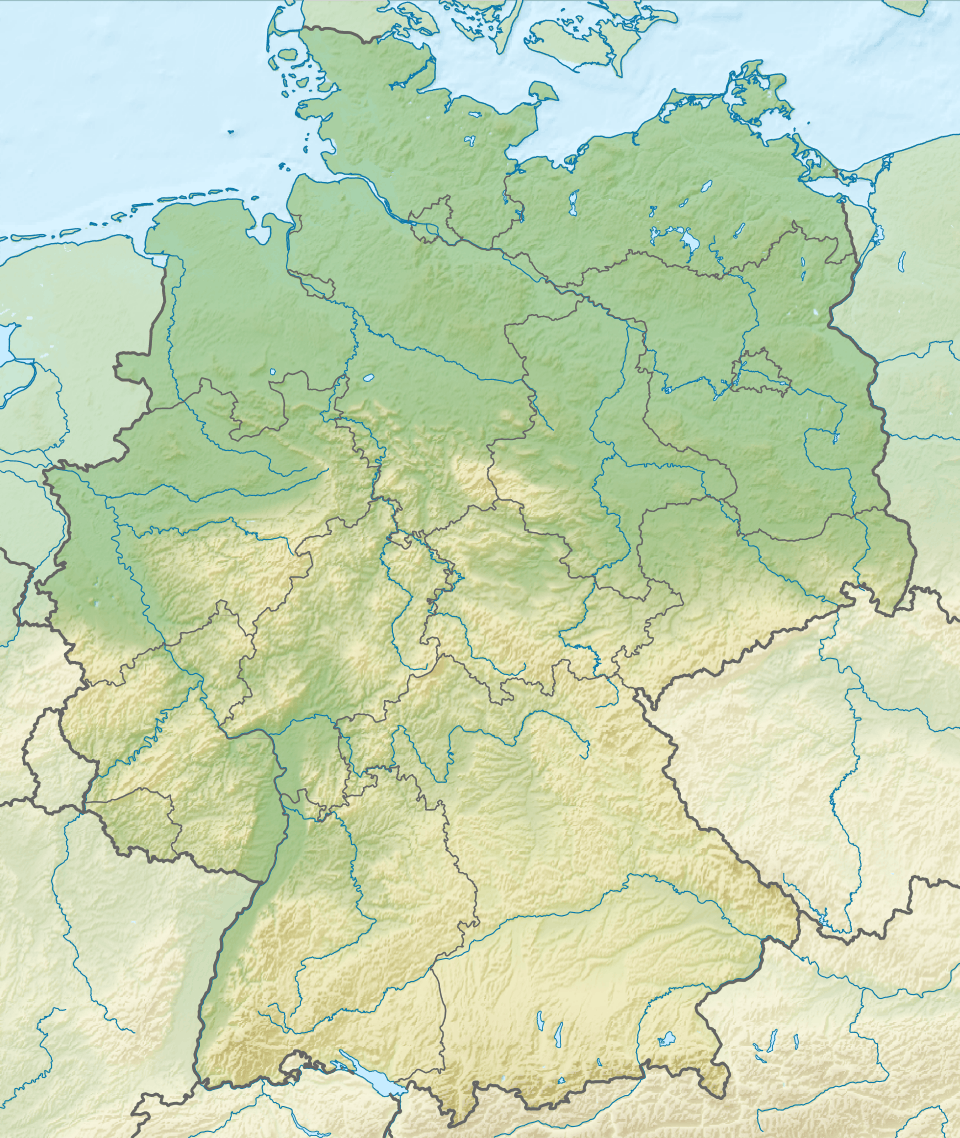 Röt Formation (Germany) | |
The limestones, mudstones, shales and sandstones of the formation, deposited in a shallow marine environment, have provided fossils of early archosaurs, temnospondyls, fish and insects.
Fossil content
The formation has provided the following fossils:[1]
| Group | Taxa | Notes | Images |
|---|---|---|---|
| Temnospondyls | Eocyclotosaurus woschmidti | [4][5] | 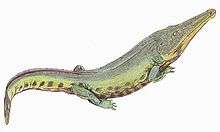 |
| Heptasaurus cappelensis (described as Mastodonsaurus cappelensis) | [4] | 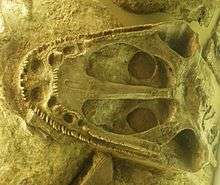 | |
| Capitosauria indet. | [6] | ||
| Reptiles | Amotosaurus rotfeldensis | [7] | 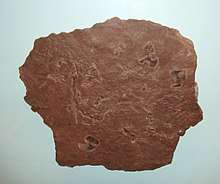 |
| Anomoiodon krejcii | [7] | ||
| Crenelosaurus nigrosilvanus | [7] | ||
| Cymatosaurus erikae | [8] | ||
| C. erytheus | [8] | ||
| C. fridericianus | [9] | ||
| Sclerosaurus armatus | [10] | 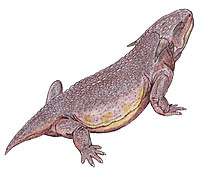 | |
| Seemannia palaeotriadica | [11] | ||
| Ctenosauriscidae indet. | [6] | ||
| Fish | Selachii indet. | [6] | |
| Insects | Rhoeniella granulata | [12] | |
Correlations
Based on the fossils of early archosaurs, the formation is correlated with the Donguz Formation of Russia, the upper Heshanggou Formation of China and the Holbrook Member of the Moenkopi Formation of Arizona.[3]
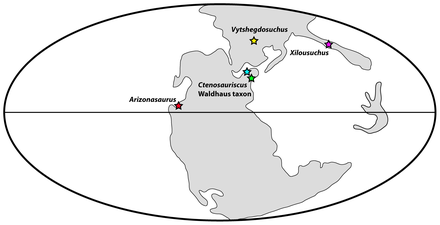 Paleogeography of the Early Triassic with archosaur fossil finds
Paleogeography of the Early Triassic with archosaur fossil finds Early Triassic formations with archosaur fossil finds
Early Triassic formations with archosaur fossil finds
See also
- List of fossiliferous stratigraphic units in Germany
- Anisian formations
- Besano Formation, fossiliferous formation of the Alps
- Manda Formation, fossiliferous formation of Tanzania
- Omingonde Formation, fossiliferous formation of Namibia
References
- Röt Formation at Fossilworks.org
- Butler et al., 2011, p.2
- Butler et al., 2011, p.25
- Schoch & Werneburg, 1999
- Fraser & Rieppel, 2006
- Butler et al., 2011
- Ortlam, 1967
- Rieppel, 1997
- Rieppel, 1999
- Sues & Reisz, 2008
- Von Huene, 1958
- Ansorge, 1994
Bibliography
- Butler, R. J.; Brusatte, S. L.; Reich, M.; Nesbitt, S. J.; Schoch, R. R.; Hornung, J. J. (2011). "The sail-backed reptile Ctenosauriscus from the latest Early Triassic of Germany and the timing and biogeography of the early archosaur radiation". PLOS ONE. 6 (10): 1–28. Bibcode:2011PLoSO...625693B. doi:10.1371/journal.pone.0025693. PMC 3194824. PMID 22022431.
- Sues, H.-D.; Reisz, R. R. (2008). "Anatomy and Phylogenetic Relationships of Sclerosaurus armatus (Amniota: Parareptilia) from the Buntsandstein (Triassic) of Europe". Journal of Vertebrate Paleontology. 28 (4): 1031–1042. doi:10.1671/0272-4634-28.4.1031. S2CID 53967912.
- Fraser, N. C.; Rieppel, O. (2006). "A new protorosaur (Diapsida) from the Upper Buntsandstein of the Black Forest, Germany". Journal of Vertebrate Paleontology. 26 (4): 866–871. doi:10.1671/0272-4634(2006)26[866:ANPDFT]2.0.CO;2.
- Rieppel, O (1999). "Variation of cranial characters in Cymatosaurus "gracilis" Schrammen 1899 (Reptilia, Sauropterygia), and its implications for systematics". Paläontologische Zeitschrift. 73 (3–4): 369–375. doi:10.1007/BF02988047. S2CID 84238070.
- Schoch, R. R.; Werneburg, R. (1999). "The Triassic labyrinthodonts from Germany". Zentralblatt für Geologie und Paläontologie, Teil I. 7–8: 629–650.
- Ebel, K.; Falkenstein, F.; Haderer, F.-O.; Wild, R. (1998). "Ctenosauriscus koeneni (v. Huene) und der Rauisuchier von Waldshut - Biomechanische Deutung der Wirbelsäule und Beziehungen zu Chirotherium sickleri Kaup". Stuttgarter Beiträge zur Naturkunde, Serie B. 261: 1–18.
- Rieppel, O (1997). "Revision of the sauropterygian reptile genus Cymatosaurus v. Fritsch, 1894, and the relationships of Germanosaurus Nopcsa, 1928, from the Middle Triassic of Europe". Fieldiana: Geology. New Series. 36: 1–36.
- Ansorge, J (1994). "Rhoeniella granulata gen. et sp. nov. (Insecta: Hemiptera) aus dem Oberen Buntsandstein der Rhön (Hessen)". Senckenbergiana Lethaea. 74: 325–327.
- Ortlam, D (1967). "Fossile Böden als Leithorizonte für die Gliederung des Höheren Buntsandsteins im nördlichen Schwarzwald und südlichen Odenwald". Geologisches Jahrbuch. 84: 485–590.
- Von Huene, F (1958). "Ein Pseudosuchier aus dem Buntsandstein des Schwarzwalds [A pseudosuchian from the Buntsandstein of the Black Forest]". Jahreshefte des Vereins für Vaterländische Naturkunde in Württemberg. 113: 111–112.